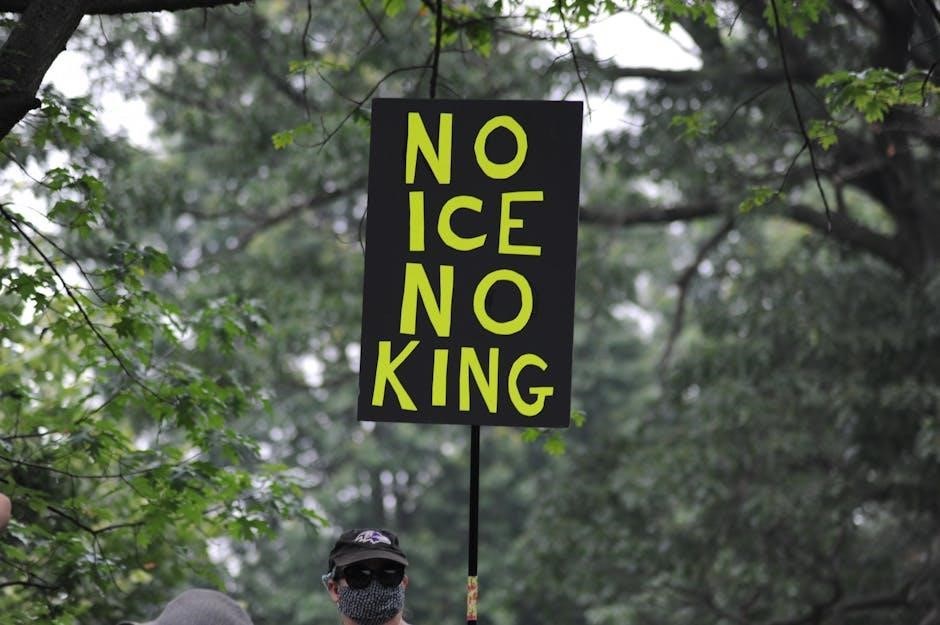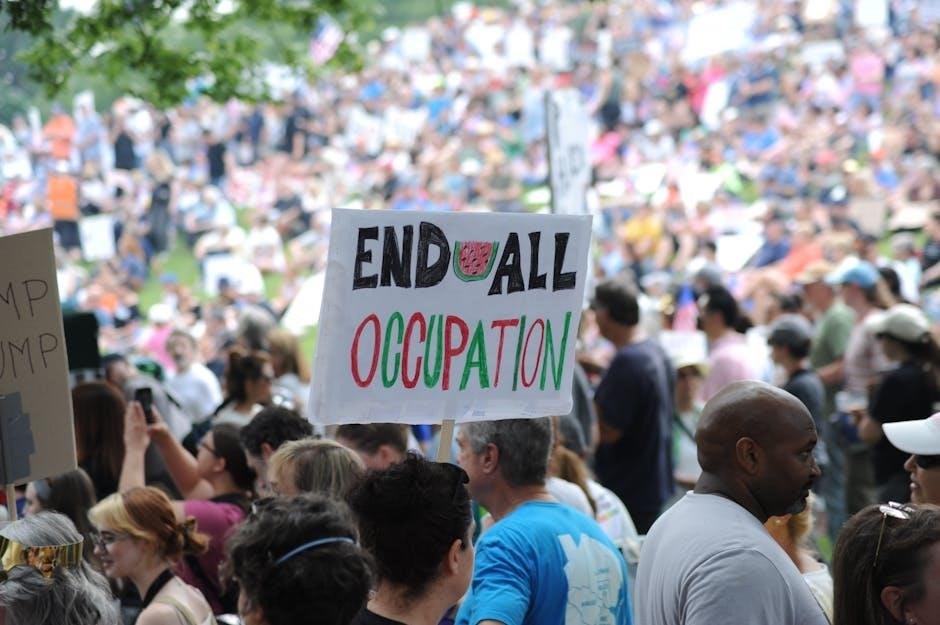The Maryland Homeowners Association Act regulates HOAs‚ ensuring transparency‚ fairness‚ and accountability. It balances homeowner rights with community standards‚ fostering harmonious living environments through clear governance guidelines.
Purpose of the Act
The Maryland Homeowners Association Act aims to regulate and oversee HOAs‚ ensuring they operate fairly and transparently. Its primary purpose is to protect homeowners by establishing clear guidelines for HOA governance‚ financial management‚ and dispute resolution. The Act promotes stability and accountability within communities‚ preventing abuses of power and fostering a balanced relationship between homeowners and their associations. It also ensures that HOAs maintain the quality of neighborhoods while respecting individual property rights. By providing a legal framework‚ the Act helps resolve conflicts and safeguards the interests of both homeowners and the community as a whole‚ promoting harmonious living environments.
Structure and Governance of HOAs in Maryland
In Maryland‚ HOAs are typically structured as non-profit corporations‚ governed by a board of elected volunteers from the community. These boards oversee the enforcement of rules‚ manage finances‚ and maintain common areas. The governance framework ensures transparency and accountability‚ with meetings and decisions subject to specific legal requirements. Homeowners have the right to participate in elections and attend meetings‚ fostering a collaborative environment. The Act emphasizes balanced governance‚ ensuring that HOAs operate fairly while protecting homeowner rights and maintaining community standards.

Key Components of the Maryland Homeowners Association Act
The Act outlines the establishment‚ governance‚ and enforcement mechanisms for HOAs‚ ensuring fairness in assessments‚ meetings‚ and rule enforcement while protecting homeowner rights and community interests.
Establishment and Powers of HOAs
In Maryland‚ homeowners associations (HOAs) are typically established as non-profit corporations‚ governed by a board of elected volunteers from the community. The HOA’s powers are derived from its governing documents‚ including the Articles of Incorporation‚ Bylaws‚ and the Declaration of Covenants‚ Conditions‚ and Restrictions (CC&Rs). These documents outline the authority of the HOA to enforce rules‚ manage common areas‚ and collect assessments. The HOA has the legal ability to impose liens on properties for unpaid dues and violations of community rules. Its primary role is to maintain the quality of the community and ensure compliance with established standards‚ balancing individual homeowner rights with collective interests.
Meetings and Decision-Making Processes
The Maryland Homeowners Association Act outlines specific requirements for meetings and decision-making to ensure transparency and fairness. HOAs must provide adequate notice for meetings‚ allowing homeowners to participate. A quorum is typically required for major decisions‚ and voting procedures are structured to reflect the collective interests of the community. The Act also addresses how decisions are documented and communicated to members. Open meetings foster accountability‚ while rules on proxies and absentee voting ensure inclusivity. Dispute resolution mechanisms are included to address conflicts arising from decision-making processes‚ ensuring that all stakeholders’ voices are heard and respected within the governance framework. This promotes a balanced and democratic approach to community management.
Assessments and Fees
Under the Maryland Homeowners Association Act‚ HOAs are authorized to collect assessments and fees from homeowners to fund community maintenance‚ services‚ and amenities. These fees are typically determined by the HOA board and approved through an annual budget. Homeowners are legally obligated to pay these assessments‚ which may include regular dues and special assessments for specific projects. Delinquency in payment can result in late fees‚ penalties‚ or even liens on the property. The Act requires HOAs to provide clear notice of assessment amounts and due dates‚ ensuring transparency and fairness for all residents. Disputes over assessments must be addressed through established conflict resolution processes.
Enforcement Mechanisms
The Maryland Homeowners Association Act outlines specific enforcement mechanisms to ensure compliance with community rules and regulations. HOAs can impose fines‚ suspend privileges‚ or file liens against properties for unpaid assessments or violations. Legal action‚ including lawsuits‚ may be pursued for significant breaches. Homeowners receive notice and an opportunity to address issues before enforcement actions escalate. These mechanisms aim to maintain community standards while protecting homeowner rights. Proper documentation and transparency are required to ensure fair enforcement practices. The Act balances the authority of HOAs with safeguards to prevent abuse‚ fostering a fair and structured environment for all residents.

Homeowners’ Rights and Responsibilities
Homeowners in Maryland have rights like displaying political signs and responsibilities to adhere to HOA rules‚ ensuring community harmony and legal compliance through active participation in governance.
Understanding HOA Rules and Regulations
Homeowners Association (HOA) rules and regulations are designed to maintain community standards‚ safety‚ and property values; These guidelines cover various aspects of property use‚ such as architectural standards‚ landscaping‚ and noise levels. Understanding these rules is essential for homeowners to avoid violations‚ which can lead to fines or legal disputes. The Maryland Homeowners Association Act ensures that HOAs operate transparently‚ with clear documentation of their rules and regulations. Homeowners are encouraged to review these documents before purchasing a property to ensure compliance. The Act also emphasizes fair enforcement of rules‚ protecting both homeowners and the community from conflicts and disputes. Awareness of these regulations fosters a harmonious living environment.
Displaying Political Signs in HOA Communities
The Maryland Homeowners Association Act addresses the display of political signs‚ ensuring homeowners’ freedom of expression while maintaining community standards. HOAs cannot outright ban political signage but may impose reasonable regulations regarding size‚ placement‚ and duration. This balance respects both individual rights and neighborhood aesthetics. Homeowners should review their community’s specific rules to ensure compliance. The Act emphasizes that such regulations must not infringe on constitutional rights‚ fostering a fair environment for political expression within HOA-governed neighborhoods.
Resale Disclosure Requirements
The Maryland Homeowners Association Act mandates specific disclosures for resale transactions within HOA-governed communities. Sellers must provide potential buyers with detailed documentation‚ including the HOA’s governing documents‚ financial statements‚ and meeting minutes. This ensures transparency and informs buyers about community rules‚ fees‚ and potential liabilities. The Act requires sellers to disclose any outstanding assessments or violations related to the property. Additionally‚ buyers must be notified of their rights and responsibilities within the HOA. These requirements aim to protect consumers by ensuring they have all necessary information before finalizing a purchase. Failure to comply may result in legal consequences for the seller or the HOA. Proper disclosure fosters trust and clarity in real estate transactions.
Legal and Financial Aspects
The Maryland HOA Act addresses financial responsibilities‚ including lien placements for unpaid dues‚ insurance coverage‚ and legal dispute resolutions‚ ensuring equitable governance and homeowner protection.
HOA Liens and Delinquent Payments
An HOA lien is a legal claim filed against a property when a homeowner fails to pay dues or assessments. In Maryland‚ HOAs can enforce liens to recover delinquent payments. Homeowners receive notice before a lien is filed‚ allowing time to settle debts. If unpaid‚ the lien can lead to foreclosure‚ impacting the homeowner’s credit and property rights. The process ensures HOAs maintain financial stability while protecting homeowners from unfair practices. Understanding lien procedures is crucial for both HOAs and residents to avoid disputes and ensure timely resolutions.
Insurance Issues and HOA Governance
The Maryland Homeowners Association Act addresses insurance issues‚ ensuring HOAs maintain adequate coverage for common areas and liabilities. This includes property damage and liability insurance to protect the community and its members. HOAs must disclose insurance details to homeowners‚ promoting transparency and accountability. Proper insurance governance is critical to safeguarding community assets and ensuring compliance with state laws.
The Act also outlines the HOA board’s role in managing insurance policies‚ ensuring they align with the community’s needs and legal requirements. Homeowners are protected from insufficient coverage‚ and the Act encourages regular reviews of insurance policies to adapt to changing risks and community growth.
Legal Disputes and Conflict Resolution
Legal disputes within Maryland HOAs often arise from issues like unpaid fees‚ rule violations‚ or governance disagreements. The Act provides frameworks for resolving conflicts‚ emphasizing mediation and arbitration to avoid litigation. Homeowners and boards must adhere to established protocols‚ ensuring fair representation and transparency. Disputes may involve covenant violations‚ enforcement of rules‚ or financial disagreements. The law encourages amicable resolutions to maintain community harmony. If unresolved‚ court intervention may be necessary‚ with potential penalties for non-compliance. This process balances individual rights with collective community standards‚ ensuring equitable outcomes while upholding the HOA’s authority. Effective conflict resolution is crucial for maintaining a functional and peaceful living environment.

Community Governance and Management
Community governance involves HOA boards managing daily operations‚ enforcing rules‚ and maintaining common areas to ensure smooth community functioning and uphold property values effectively.
Role of the HOA Board
The HOA board in Maryland is responsible for governing the community‚ ensuring compliance with rules‚ and managing finances. Elected by homeowners‚ the board oversees maintenance‚ enforces regulations‚ and makes decisions to preserve property values. It acts in the best interest of the community‚ addressing concerns and resolving disputes. The board also organizes meetings‚ approves budgets‚ and handles legal matters‚ playing a vital role in maintaining harmony and order within the neighborhood.
Reviewing HOA Documents and Violations
Homebuyers in Maryland have the right to review HOA documents‚ including Articles of Incorporation‚ Bylaws‚ and CC&Rs‚ before purchase. These documents outline rules‚ fees‚ and governance structures. Violations of HOA rules are addressed through formal processes‚ ensuring fairness and transparency. Homeowners can request document reviews to understand their obligations and potential penalties. The HOA board is responsible for enforcing rules and resolving disputes‚ maintaining community standards. Public access to these documents ensures accountability and informed decision-making for homeowners. Understanding violations procedures helps homeowners navigate conflicts and comply with community regulations effectively.
Infrastructure and Maintenance Responsibilities
Under the Maryland Homeowners Association Act‚ HOAs are responsible for maintaining and repairing common areas and infrastructure‚ such as roads‚ parks‚ and amenities. This ensures property values are preserved and communities remain functional. HOAs must allocate funds for routine maintenance‚ repairs‚ and replacements‚ while also addressing unexpected issues. Homeowners are required to adhere to maintenance standards set by the HOA‚ which may include landscaping and exterior alterations. The Act emphasizes transparency in how maintenance decisions are made and funded‚ ensuring accountability to homeowners. Disputes over maintenance responsibilities can arise‚ but the Act provides frameworks for resolution‚ balancing community needs with individual rights.
- Common areas are managed collectively for all residents’ benefit.
- Homeowners must comply with maintenance rules to uphold community standards.

Consumer Protection and Public Access
The Act mandates disclosure requirements‚ ensuring buyers receive essential information about HOA rules‚ fees‚ and rights. Public access to HOA documents fosters transparency and accountability.
Disclosure Requirements for Homebuyers
The Maryland Homeowners Association Act mandates specific disclosures to ensure transparency for prospective buyers. Sellers must provide detailed documentation‚ including the HOA’s governing documents‚ financial statements‚ and any fees associated with the property. This includes the Declaration of Covenants‚ Conditions‚ and Restrictions (CC&Rs)‚ bylaws‚ articles of incorporation‚ and recent budgets. Buyers must also be informed about any pending legal issues or assessments. These disclosures aim to protect consumers by ensuring they fully understand the rules‚ regulations‚ and financial obligations of the HOA before finalizing a purchase. This requirement helps buyers make informed decisions and avoids potential disputes or surprises after ownership is transferred.
Public Accessibility of HOA Rules and Regulations
The Maryland Homeowners Association Act emphasizes transparency by requiring HOAs to make their rules‚ regulations‚ and governing documents accessible to the public; Homeowners and prospective buyers can request and review these documents‚ ensuring awareness of community standards. This accessibility fosters trust and accountability‚ allowing residents to understand their obligations and rights. The Act mandates that HOAs provide clear disclosures‚ including CC&Rs and bylaws‚ to ensure transparency in governance. Public access to these materials helps prevent disputes and ensures compliance with state laws‚ promoting a fair and informed community environment for all homeowners.
Amendments to the Maryland HOA Act
The Maryland HOA Act has undergone amendments to address evolving community needs and legal challenges. Recent updates aim to enhance transparency‚ ensuring homeowners receive clear disclosures about fees‚ rules‚ and financial obligations. Changes also focus on streamlining dispute resolution processes and clarifying enforcement powers. Amendments often reflect feedback from homeowners and legal experts‚ aiming to balance community governance with individual rights. These revisions ensure the Act remains relevant‚ fostering fair and accountable HOA practices while protecting homeowners’ interests and maintaining community harmony.
The Maryland Homeowners Association Act ensures transparency and fairness‚ balancing homeowner rights with community standards. It fosters harmonious living through clear governance‚ protecting both homeowners and communities effectively.
Impact of the Maryland HOA Act on Homeowners
The Maryland HOA Act significantly impacts homeowners by providing clear protections and guidelines. It ensures transparency in HOA operations‚ including fee assessments and enforcement processes‚ while safeguarding homeowner rights. The Act mandates disclosure requirements‚ enabling homebuyers to make informed decisions. It also addresses insurance issues‚ ensuring adequate coverage for common areas. Homeowners benefit from structured dispute resolution mechanisms‚ reducing conflicts with HOAs. Additionally‚ the Act promotes fair governance‚ preventing arbitrary rule enforcement and ensuring homeowners have a voice in community decisions. Overall‚ it fosters a balanced environment‚ enhancing quality of life and property values while maintaining community standards.
Future Developments in HOA Governance
The Maryland Homeowners Association Act is expected to evolve‚ addressing emerging issues like digitalization of governance and transparency. Future reforms may focus on enhancing homeowner protections and streamlining dispute resolution processes. Environmental sustainability practices could become more prominent in HOA regulations. Additionally‚ there may be efforts to clarify rules on political signage and architectural modifications. Legal reforms might also aim to prevent HOA overreach while ensuring fair enforcement of community standards. Stakeholders‚ including lawmakers and homeowner advocates‚ will likely collaborate to refine the Act‚ ensuring it adapts to changing community needs and legal landscapes. These developments will shape the future of HOA governance in Maryland.
